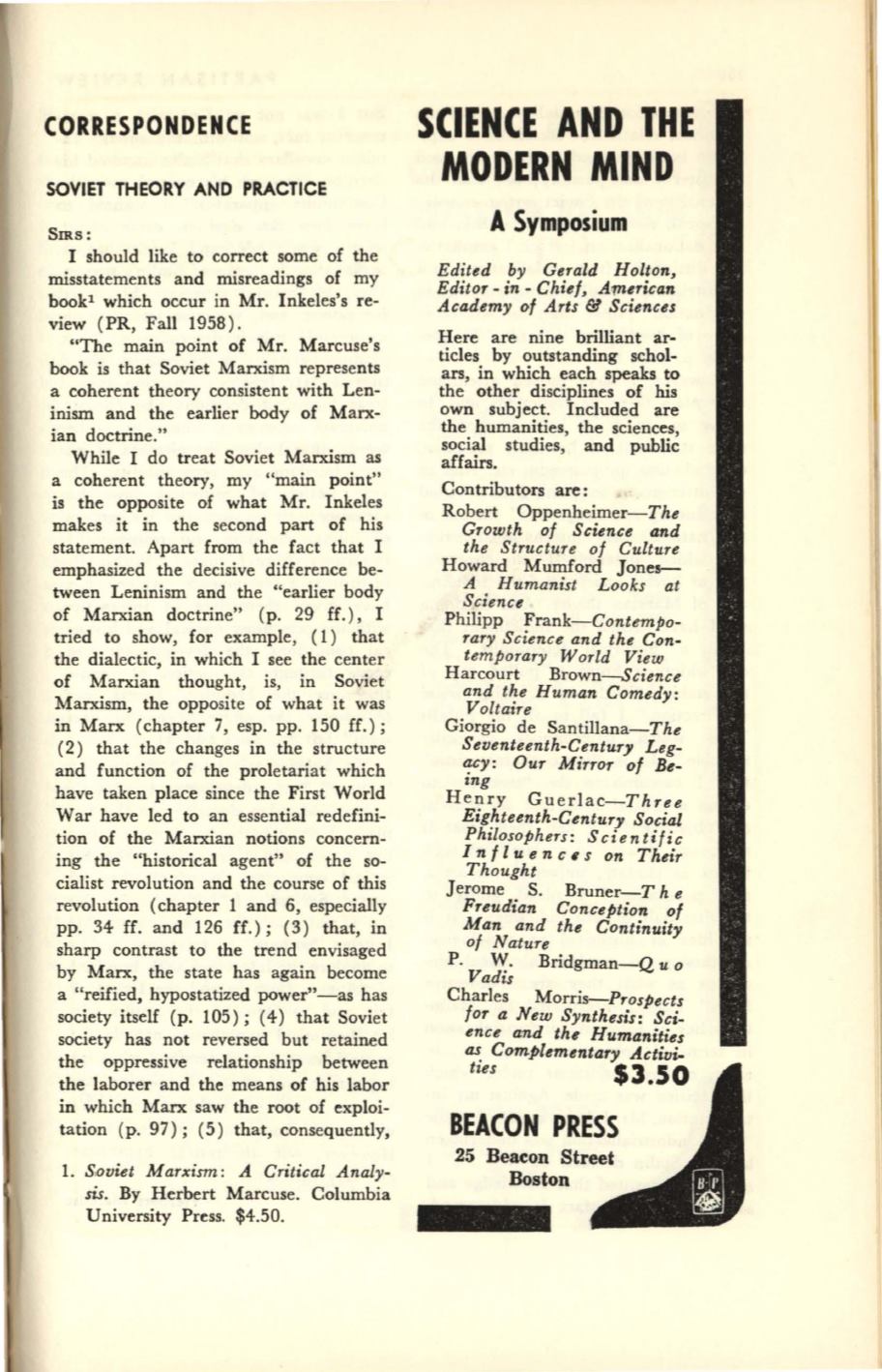
CORRESPONDENCE
SOVIET THEORY AND PRACTICE
SIRS:
I should like to correct some of the
misstatements and misreadings of my
book
1
which occur in Mr. Inkeles's re–
view (PR , Fall 1958).
"The main point of Mr. Marcuse's
book is that Soviet Marxism represents
a coherent theory consistent with Len–
inism and the earlier body of Marx–
ian doctrine."
While I do treat Soviet Marxism as
a coherent theory, my "main point"
is the opposite of what Mr. Inkeles
makes it in the second part of his
statement. Apart from the fact that I
emphasized the decisive difference be–
tween Leninism and the "earlier body
of Marxian doctrine" (p. 29 ff. ), I
tried to show, for example, (1) that
the dialectic, in which I see the center
of Marxian thought, is, in Soviet
Marxism, the opposite of what it was
in Marx (chapter 7, esp. pp. 150 ff.);
(2) that the changes in the structure
and function of the proletariat which
have taken place since the First World
War have led to an essential redefini–
tion of the Marxian notions concern–
ing the "historical agent" of the so–
cialist revolution and the course of this
revolution (chapter 1 and 6, especially
pp. 34 ff. and 126 ff.); (3) that, in
sharp contrast to the trend envisaged
by Marx, the state has again become
a "reified, hypostatized power"-as has
society itself (p. 105); (4) that Soviet
society has not reversed but retained
the oppressive relationship between
the laborer and the means of his labor
in which Marx saw the root of exploi–
tation (p. 97); (5) that, consequently,
1.
Soviet Marxism : A Critical Analy–
sis.
By Herbert Marcuse. Columbia
University Press. $4.50.
SCIENCE AND THE
MODERN MIND
ASymposium
Edited by Gerald Holton,
Editor
-
in
-
Chief, American
Academy of Arts
&
Sciences
Here are nine brilliant ar–
ticles by outstanding schol–
ars, in which each speaks
to
the other disciplines of his
own subject. Included are
the humanities, the sciences,
social studies, and public
affairs.
Contributors are:
Robert Oppenheimer-The
Growth of Science and
the Structure of Culture
Howard Mumford Jones-
A Humanist Looks at
Science
Philipp
Frank-Contempo–
rary Science and the Con–
temporary World View
Harcourt
Brown--Science
and the Human Comedy:
Voltaire
Giorgio de Santillana-The
Seventeenth-Century Leg–
'!Cy: Our Mirror of Be–
mg
Henry Guerlac-Three
Eighteenth-Century Social
Philosophers : Scientific
In flu e
n
c. s on Their
Thought
Jerome S. Bruner-T
he
Freudian Conception of
Man and the Continuity
of Nature
P.
W. Bridgman-Q u
0
Vadis
Charles
Morris-Prospects
for a New Synthesis: Sci–
ence and the Humanities
~
Complementary Activi–
ties
$3.50
BEACON
PRESS
25 Beacon Street
Boston
-


